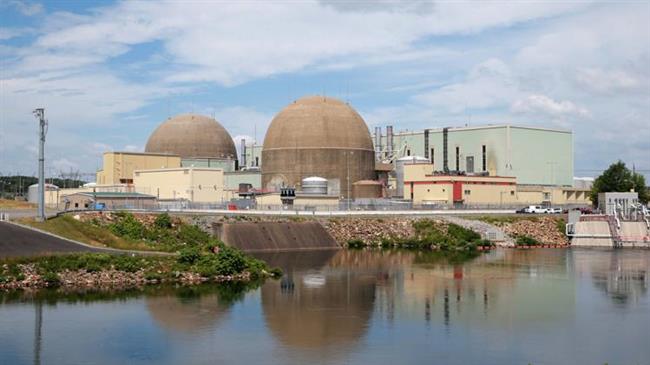Radioactive water leak shuts down nuclear reactor at major US power plant
A US nuclear power plant has shut down one of its two reactors after operators discovered a “small leak of water” in the reactor’s coolant pumps, said the company amid recurrence of similar incidents at other nuclear sites in the country.
The Virginia-based Dominion Energy company shut down the nuclear reactor at its North Anna Power Station near the city of Richmond at about 1:30 a.m. on Thursday after noticing the water leak at the rate of nearly 0.1 gallons per minute, said company spokesman Ken Holt on Friday as quoted in a report by the local daily Richmond Times-Dispatch.
“The water from the leak was contained in the containment building and did not go into the environment,” Holt said. “The source has been identified, and repairs are underway. All the systems operated as designed during the shutdown, and the reactor is currently offline and stable while repairs are being made.”
According to the report, the plant’s unit 2 reactor remained offline on Friday but its unit 1 reactor was unaffected and continued to operate at 100 percent capacity.
The Richmond-based Dominion – which provides electricity to eastern US states of Virginia, North Carolina and South Carolina -- previously shut down its unit 2 reactor at the plant because of a water leak in December 2017.
The US Nuclear Regulatory Commission has not yet reacted to the reported nuclear leak.
The giant company operates two 980-megawatt nuclear reactors at the 1,043-acre North Anna Power Station. Each unit can produce enough energy for nearly 225,000 homes.
The development marked the latest water leak at a US nuclear facility in a series of similar incidents at other reactors across the country.
Back in November 2019, another Dominion power plant in South Carolina shut down one of its nuclear reactors after officials found what they described as a small leak in the coolant system.
The company spokesman further insisted at the time that the water leak at its V. C. Summer reactor did not escape beyond the plant’s containment building and it posed no danger to the public.
Moreover, in a series of articles in November 2017, the Associated Press revealed that radioactive waste from nuclear power plants in the Midwestern state of Illinois – owned by the giant Chicago-based Exelon Corporation – continued to spill out “more than a decade after discovery of chronic leaks led to national outrage, a $1.2 million government settlement and a company vow to guard against future accidents.”
The report further underlined that since 2007, there had been at least 35 reported leaks, spills or other accidental releases across the state of water contaminated with radioactive tritium -- a byproduct of nuclear power production and a carcinogen at high levels, citing official federal and state records.
It added that the most recent leak of 35,000 gallons at the time occurred over two weeks in May and June of 2017 at Exelon’s Braidwood plant southwest of Chicago, “and was ongoing even as state inspectors were at the plant and being assured by Exelon officials there were no problems.”

It further noted that Braidwood is the same facility that was the focus of a community panic in the mid-2000s after a series of accidents triggered debate over the safety of aging US nuclear plants.
A 2014 incident at Exelon’s Dresden facility in Grundy County, the report added, involved the release of nearly 500,000 gallons of highly radioactive water, emphasizing that “contamination was later found in the plant’s sewer lines and miles away in the city sewage treatment plant at Morris.”
According to the report, “among the 61 nuclear power plants operating in the US, more than half have reactors that are at or near the end of their originally expected lifespans.”

Columbia president quits amid Trump’s crackdown on pro-Palestinian activism

Academy faces backlash for failing to support Oscar-winning Palestinian filmmaker

US agents conduct 'off campus' arrest of Iranian PhD student
Israel targets ambulances, health center in Lebanon despite truce
Iran calls on Shanghai bloc to condemn Trump’s 'dangerous' threats
VIDEO | Iraq’s electricity shortage and US sanctions on Iran
Death toll from Myanmar quake rises to over 3,085
US militarization in West Asia reaches unprecedented levels: Report
VIDEO | The 1992 Clonoe Killings
VIDEO | Columbia University students chain themselves to gate in support of Mahmoud Khalil
Hungary to quit ICC as fugitive Israeli PM visits European state










 This makes it easy to access the Press TV website
This makes it easy to access the Press TV website